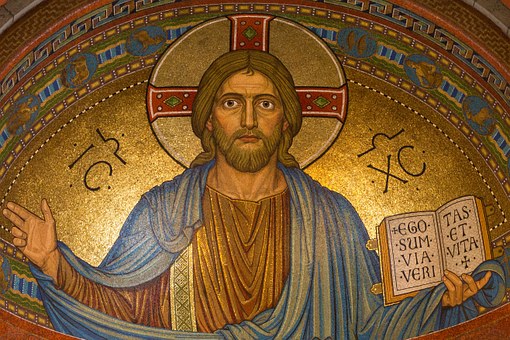
The Christian Church affirms the major theological formulations of the historic ecumenical Councils of the past, specifically those of Jerusalem (30 AD,) Nicea (325 AD,) Constantinople (381 AD,) Ephesus (431 AD,) Chalcedon (451 AD,) and Constantinople (553 and 680 AD.) It denounces those of more recent convocation, especially Nicea (787 AD,) Trent (1545-63 AD,) and Dort (1618-9 AD.) It also affirms and accepts the texts of orthodox creedal statements, specifically the Apostles’ Creed, the Nicene Creed, and the Creed of Saint Athanasius, the Quicunque Vult.
In order to more fully and accurately propound the claims of Jesus of Nazareth, the Church also affirms the following:
-
- God the Father does not judge a sinful and rebellious humanity. He sent His only Son to save humanity (John 5:22.)
- Jesus of Nazareth, known as the Messiah or Christ, does not judge a sinful and rebellious humanity either. He voluntarily went to the cross to save humanity (John 12:47.)
- The sacrificial death of Jesus Christ in or around 30 AD in Judea has justified and reconciled a sinful and rebellious humanity to the one, holy and righteous God. This applies to all people, of all races and religions, of all ages and circumstances, in all times and all places. There is no need for further forensic action or sacerdotal observance to complete or complement this objective and historic reality. Each person has, through the express will of the Father and the obedience of the Son, been placed “in Christ.” Jesus Christ is the Savior of the whole world (I John 2:2.)
- All that is required of each person to maintain this state of peace and reconciliation is to submit to Jesus Christ as the living Lord (John 15:9-17.) For the individual who has not heard the Gospel of our Lord Jesus Christ, this is done through obedience to the requirements of the moral law written on their hearts and attested to by their conscience (Romans 2:14,15.) The human conscience is an adequate if imperfect guide to behavior in the absence of an active Christian witness. For those who have heard the objective facts of the Christian Gospel, obedience to the dictates of the Holy Scriptures is required, and a higher standard of judgment is applied (Luke 12:47,8.)
- The arbiter of moral rectitude and divine judgment are the words of Jesus Christ as recorded in the Holy Scriptures of the Old and New Testaments known as the Bible (John 12:48-50.) The Bible was written by human authors under the sufficient control and inspiration of the Holy Spirit, and constitutes the Word of God. Chief among its requirements is that we show mercy to our fellow man, as we ourselves have been the recipients of mercy from God (Mt 18:23-35.) To ignore, discredit or distort the words of the Bible is to commit the only sin deemed unforgivable by our Lord Jesus Christ, as it constitutes
blaspheming the Holy Spirit (Luke 12:10.) God’s wrath falls on those who reject His plan of salvation through willful disobedience.
- Humans, lacking any capacity for obedience to God or positive moral action in and of themselves, nevertheless have a responsibility before God and each other. Our responsibility is that we recognize our incapacity for obedience and positive response to the Gospel, and to defer to the authority of the risen Christ, in the person of the Holy Spirit. Our task is negative, to get out of the way, and let God do in us what we cannot do ourselves. We cannot be saved by works, but we can be damned by them.
- God endorses and uses secular authority to complement the work of His Spirit on earth. Those who are governed by the direction and power of the Holy Spirit will of necessity be good citizens, striving to create order, harmony and beauty in the world. Those who are not submissive to and obedient to the guidance of the Spirit must of necessity submit to the dictates of legitimate earthly and secular authority, as they are God’s tools to bring about peace, order and useful industry. Those who rebel against legitimate authority in any way are rebelling against God Himself (Romans 13:1-7, 1 Peter 2:13-17.)
- God does not require subscription to any ideological, sociological or cultural formulae beyond conformance to the behavioral norms represented by the Ten Commandments (Exodus 20:3-17, Acts 15:1-29.) God does not require ritualistic or sacerdotal observance (1 Samuel 15:22-23, Psalm 40:6-8, Psalm 51:16-17, Proverbs 21:3, Isaiah 1:11-20, all of Isaiah 58, Isaiah 66:2-6, Jeremiah 6: 20-21, 7:21-29, Hosea 6:6, Amos 5:21-24, Micah 6:6-8, Zechariah 7:4-10, Matthew 9:13, Matthew 12:7, Mark 12:33, 1 Corinthians 7:19b, and Hebrews 10:8.) God does not endorse sectarian or denominational religion in any way (Acts 8:14-17.) Religions, whether folk or formal, are useful to the extent that they contribute to the restraint of wickedness and serve as building blocks for communicating the more accurate truth about the condition of humanity apart from God and God’s sovereign and gracious actions to achieve rapprochement.
- There is one, holy, catholic and apostolic Church. All who are recognized as deacons, presbyters or bishops in any expression of that Church are to be accepted and recognized as possessing valid Holy Orders by all Christians. No expression of the Church may impose creedal, sacerdotal or cultural requirements for membership beyond those behavioral norms contained in the Holy Scriptures and affirmed by this Ecumenical Council: sexual purity, avoidance of idolatrous practices and avoidance of actions which are injurious to the lives of other Christians.